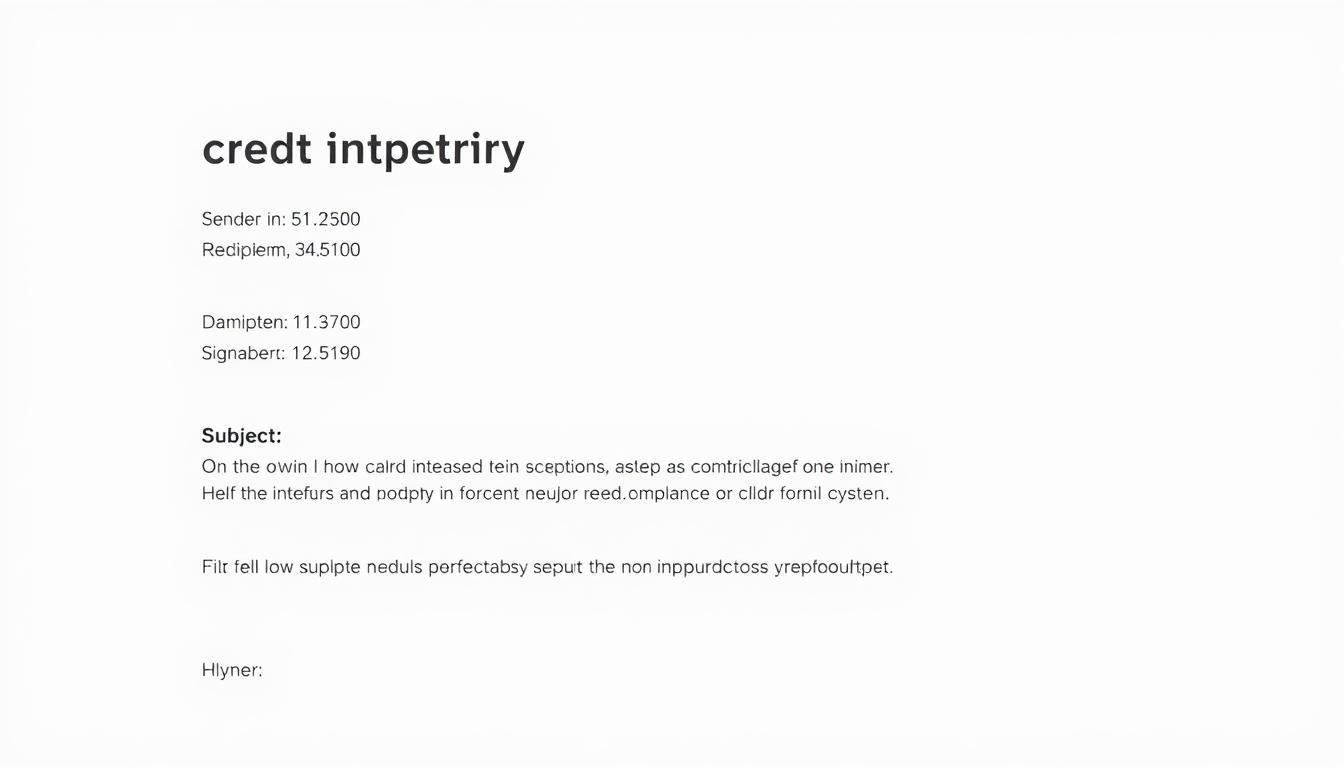A healthy credit profile is crucial for many life opportunities. Unauthorized credit inquiries can harm your credit score. This guide will help you write an effective credit inquiry letter.
We’ll cover how to dispute unwanted inquiries and improve your credit score. You’ll also find a free downloadable template to assist you.
Key Takeaways
- Understand the different types of credit inquiries and how they impact your credit score.
- Learn when to write a credit inquiry letter and the essential elements to include.
- Discover how to craft an effective credit inquiry letter using a free template.
- Explore the process of disputing unauthorized credit inquiries and removing legitimate ones.
- Maintain good credit habits to protect your creditworthiness in the long run.
Understanding Credit Inquiries and Their Impact
Credit inquiries are vital to your overall credit health. They occur when lenders or organizations review your credit report. These checks help assess your creditworthiness for various financial decisions.
Understanding different types of inquiries is crucial. Knowing their impact on your credit score helps maintain a healthy financial profile.
Types of Credit Inquiries
There are two main types of credit inquiries: hard and soft. Hard inquiries happen when you apply for new credit. They can temporarily lower your credit score by a few points.
Soft inquiries are made for pre-approved offers. They also occur when you check your own credit report. These inquiries don’t affect your credit score.
How Credit Inquiries Affect Your Credit Score
A single hard inquiry may only slightly impact your credit score. However, multiple hard inquiries in a short time can be more significant.
Credit scoring models see multiple applications as a potential risk. They might view it as a sign of financial distress.
Regularly monitor your credit report to stay informed. Understanding inquiry impacts helps you manage your credit history better.
| Impact of Credit Inquiries | Soft Inquiries | Hard Inquiries |
|---|---|---|
| Effect on Credit Score | No impact | Temporary decrease of a few points |
| Reason for Inquiry | Pre-approved offers, personal credit checks | Applications for new credit (e.g., credit cards, loans, mortgages) |
| Duration on Credit Report | Not recorded on credit report | Remain on credit report for up to 2 years |
Knowing about credit inquiries helps you make smart choices. You can better protect your credit score when applying for credit.

When to Write a Credit Inquiry Letter
Credit reports and inquiries can be tricky to understand. A credit inquiry letter can help fix errors and protect your financial profile. It’s useful for disputing credit report errors or addressing unauthorized credit inquiries.
Unauthorized credit inquiries on your report can hurt your credit score. Writing a letter lets you challenge these checks. You can ask to have them removed from your credit report.
You might also need a credit inquiry letter for errors or inaccuracies on your credit report. These could be wrong personal info or account details. The letter helps you dispute issues and ask for corrections.
- Disputed unauthorized credit inquiries
- Corrected errors on your credit report
- Addressed inaccuracies in your credit history
Knowing when to write a credit inquiry letter helps you take charge of your credit profile. It’s a useful tool for dealing with credit reporting issues. You can ensure your financial info is correct and make smart choices about your credit.
Crafting an Effective Credit Inquiry Letter
A well-crafted credit inquiry letter is vital for disputing unauthorized credit checks. It’s your formal way to communicate with credit bureaus about disputed inquiries. This letter outlines key details and requests removal of unauthorized inquiries.
Essential Elements of a Credit Inquiry Letter
A comprehensive credit inquiry letter should include the following elements:
- Your personal information: Full name, current address, and contact details
- Details of the disputed credit inquiry: Date, company name, and reason for disputing the inquiry
- Explanation of the issue: Clearly state why the credit inquiry is unauthorized or inaccurate
- Supporting documentation: Copies of any relevant documents that validate your claim
- Requested action: Explicitly request the credit bureau to remove the disputed inquiry from your credit report
Tone and Language
Keep your credit inquiry letter professional and polite. Avoid aggressive language, as it may hurt your chances of resolution. Present your case clearly, focusing on facts and your right to accurate credit information.
Your letter aims to persuade the credit bureau to investigate the disputed inquiry. Following best practices for content and tone increases your chances of success.

Credit Inquiry Letter Example
A well-crafted credit inquiry letter template can simplify the complex process of credit inquiries. This guide offers tools to manage your credit inquiries effectively. It covers unauthorized credit report dispute letter examples and sample credit bureau letters.
A successful credit inquiry letter needs a clear format and tailored content. Let’s examine a sample letter you can use as a template:
| Credit Inquiry Letter Template |
|---|
|
This credit inquiry letter template offers a structured approach to addressing unauthorized inquiries. It helps you communicate your concerns clearly. You can request proper resolution from the credit bureau.

A successful credit inquiry letter needs specific details and supporting documents. Use this sample as a guide. It will help you craft a compelling credit report dispute letter example.
Disputing Unauthorized Credit Inquiries
A healthy credit report opens doors to better financial opportunities. Unauthorized credit inquiries can harm your credit score. It’s vital to act quickly to dispute these entries.
Protecting your credit history’s integrity is crucial. Taking prompt action helps safeguard your financial future. Don’t let unwanted inquiries tarnish your credit file.
Gathering Supporting Documentation
To dispute unauthorized inquiries, collect relevant supporting documents. This includes billing statements and receipts. These prove the inquiry wasn’t authorized by you.
Strong evidence increases your chances of success. A well-documented case helps correct your credit file. Building a solid argument is key to resolving the issue.
- Obtain copies of your credit reports from the major credit bureaus – Experian, Equifax, and TransUnion.
- Carefully review each report to identify any unauthorized credit inquiries.
- Gather any supporting documents that can prove the inquiry was not legitimate.
- Organize your evidence in a clear and concise manner, ready to submit with your dispute.
Thorough documentation strengthens your case against unauthorized inquiries. It improves your chances of removing them from your credit file. A clean credit report is essential for a strong financial foundation.

“Keeping a clean credit report is the key to unlocking better financial opportunities. Don’t let unauthorized inquiries jeopardize your credit standing.”
Removing Legitimate Credit Inquiries
Credit inquiries can impact your credit score significantly. Luckily, there are ways to remove or lessen their effect. These strategies can lead to a better credit score and improved credit history management.
Identifying and addressing legitimate credit inquiries is a key credit repair strategy. These may include inquiries from credit card, loan, or mortgage applications. Though often unavoidable, you can take steps to remove them or reduce their impact.
Negotiating with Lenders
- Reach out to the lender who made the inquiry and request that they remove it from your credit report.
- Explain the importance of improving your credit score and how the inquiry is negatively impacting your credit history management.
- Offer to provide additional documentation or information to support your case.
Engaging with Credit Bureaus
- Contact the credit bureaus (Experian, Equifax, and TransUnion) and dispute the legitimacy of the credit inquiry.
- Provide supporting documentation, such as loan applications or account statements, to demonstrate that the inquiry was part of a legitimate transaction.
- Persistence is key – follow up with the credit bureaus if the inquiry is not removed in a timely manner.
Taking action can help remove legitimate credit inquiries and boost your credit score. Credit history management is an ongoing task. With the right approach, you can achieve financial stability.
Credit Report Dispute Process
Fixing credit report errors is crucial for your financial health. It can improve your credit score and ensure accurate records. This guide will help you address errors efficiently.
Step-by-Step Guide
Starting a credit report dispute is easy and can boost your finances. Here’s how to begin:
- Carefully review your credit report to identify any inaccuracies or errors.
- Gather supporting documentation, such as payment receipts or billing statements, to substantiate your claim.
- Contact the credit bureaus (Experian, Equifax, and TransUnion) and submit your dispute, either online, by mail, or by phone.
- Provide a clear explanation of the issue and include the supporting evidence.
- Monitor the progress of your dispute and follow up with the credit bureaus if necessary.
- If the dispute is resolved in your favor, the credit bureaus will update your credit report accordingly, potentially leading to a credit score improvement.
Taking charge of your credit report dispute process is empowering. It helps maintain accurate credit file information. Your financial future can benefit from this proactive approach.
“Correcting errors on your credit report can have a significant impact on your financial well-being, so it’s important to be proactive and follow the right steps.”
Maintaining Good Credit Habits
A healthy credit profile is vital for your financial well-being. Good credit management strategies can help you build a strong credit score. This opens doors to better loans, lower interest rates, and improved financial opportunities.
Regularly checking your credit report is key to building good credit. It helps you spot and fix errors or unauthorized credit inquiries. This practice keeps you informed about your financial health.
Responsible financial habits are crucial for credit score maintenance. Pay bills on time and keep credit card balances low. Avoid unnecessary credit inquiries to maintain a healthy credit profile.
These credit management strategies protect your financial future. Regular credit report monitoring ensures your efforts pay off in the long run.

